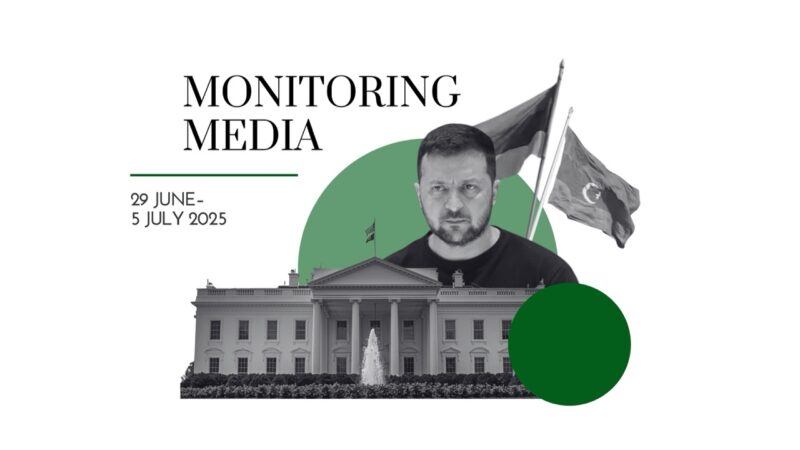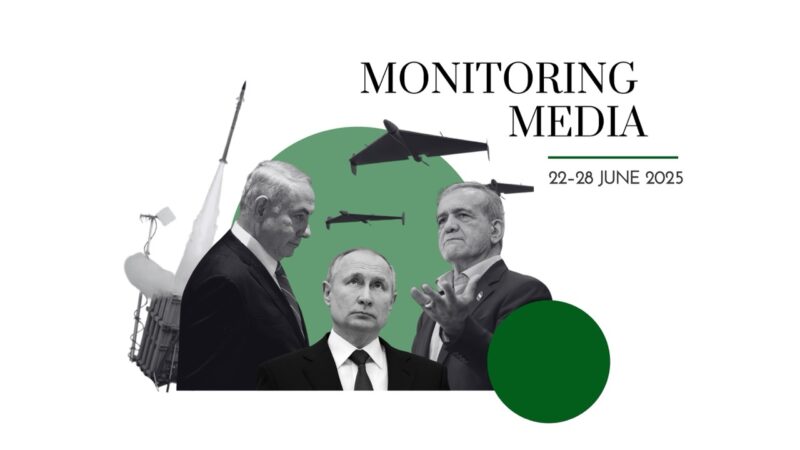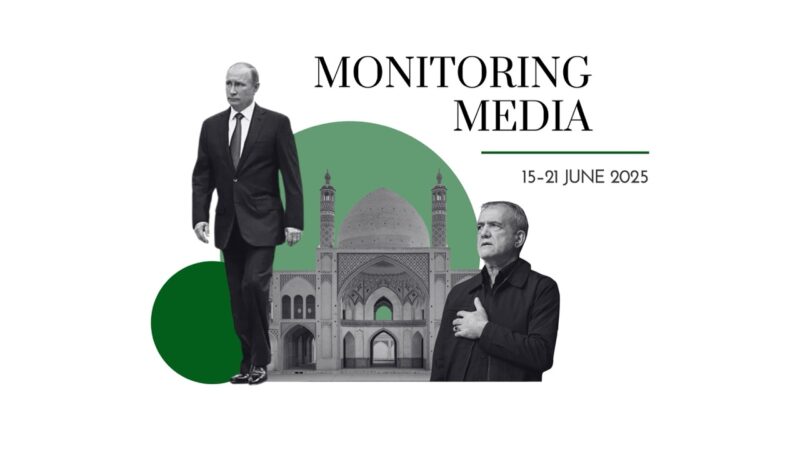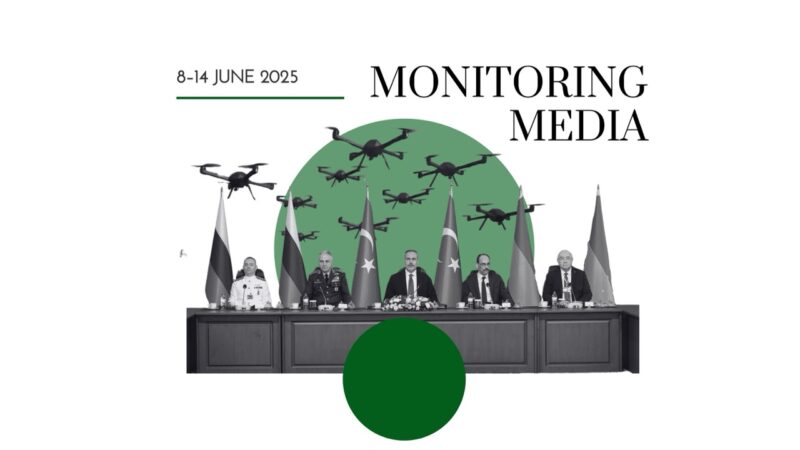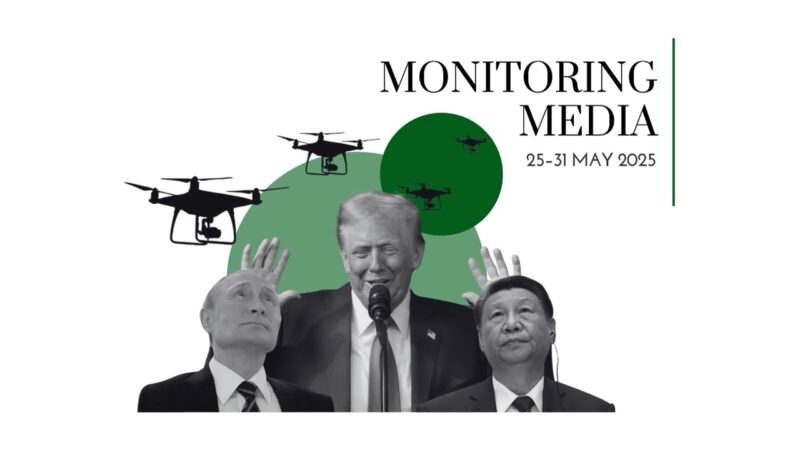With every new day, Russia fails to appear as strong as its threats

CIUS weekly report on media coverage of Ukrainian affairs, 8–14 August 2022
Three North American magazines (Foreign Affairs, Foreign Policy, and Atlantic Council) were selected to prepare this report on how the situation in Ukraine has been portrayed in the media during the week of 08–14 August 2022. The sample of magazines was created based on their impact on public opinion as well as their professional reputation, popularity among the readership, and topical relevance. These three magazines represent the centrist and liberal political spectrum.
This report covers only the most-read articles about Ukraine, as ranked by the respective magazines themselves in the given week. It also covers promoted texts on home pages, texts from special sections on Ukraine, texts from the paper editions of the magazines, and texts about Ukraine from opinion columns and editorials.
Topics featured in the selected articles:
- Ukraine at war: The attack on the military airport in Crimea was a success at many levels; Ukraine is emancipating itself from the dominance of Russian colonial culture; the younger generation is the main driver behind Ukraine’s resistance; Kyiv is the city where the newest history is being made;
- The world and Ukraine: The West is not sure that Russia is winning nor that Ukraine is losing; the West should stop regarding the Kremlin’s threats in metaphorical terms; the latest report of Amnesty International on Ukraine provokes Russia to more crimes; Europe lacks the energy resources to survive the next winter unscathed; Germany needs to learn to respond to military crises faster; the states of Central Europe have become the EU’s spearhead against Russia;
- Russia at war: The Kremlin became Beijing’s vassal in order to secure resources to continue fighting; Russia cannot execute its foreign military contracts, as itself it is running out of weapons; Russia blackmails the West with looming disaster at a Europe’s largest nuclear power plant on occupied Ukrainian territory; Russia’s war losses in Ukraine are the highest in decades.
The most common arguments:
Ukraine’s destruction of an airbase in occupied Crimea has had a profound psychological effect on Russians. In their conversation, Emma Ashford and Matthew Kroenig (Foreign Policy) come to the conclusion that Ukraine’s attack on Russia’s airbase in Crimea will not change the balance of power between the belligerents. However, this attack demonstrates that Ukraine has finally become capable of hitting Russia’s rearguard. In this light, the Kremlin’s command will need to reconsider their invasion strategy, and the topic of war will become closer to ordinary Russians. The analysts also believe that “we are now six months in [the war], and an endpoint looks further away than ever.” The endpoint of the Russo-Ukrainian war remains undefined. Neither the liberation of Crimea by the Ukrainians nor allowing Russia to keep occupied territories sound plausible or acceptable. At the same time, the West seeks to obtain certainty for its policymaking. Ashford considers that “if the Ukrainians cannot make advances in the coming months, Western leaders should be seriously looking at ways to wind this conflict down rather than prolong a stalemate at such enormous cost.” This said, Kroenig believes that the continuation of Western and especially US support to Ukraine makes “the American people safer, richer, and freer.” It is in the US’s national interest to help Ukraine win.
Ukraine tries to weaken Russia’s dominant presence in Crimea. Jack Detsch (Foreign Policy) argues that the destruction of the Crimean airbase signifies the beginning of “the long-awaited Ukrainian counteroffensive to retake the country’s southern region.” Besides the airbase, Ukraine undermined the integrity of the bridges that connect Crimea to Ukraine’s mainland. These attacks have interrupted supply deliveries from the peninsula to occupied Kherson and reduced the probability of rendered long-range missile attacks deep into Ukraine, as well as provoked a mass exodus of Russians who have been settling in Crimea since 2014. Detsch writes that “seeming to acknowledge the strikes without confirming Ukrainian involvement in a video message on Wednesday morning [10 August], Ukrainian President Volodymyr Zelensky vowed that the Crimean Peninsula would be in Ukrainian hands at the end of the war.” That said, liberation of the peninsula requires thorough preparations and will not be accomplished in a single or quick operation. At this moment, according to Detsch, Ukraine is focused on interrupting Russia’s supply chains and demonstrating to Washington that it is using the West’s long-range weapons effectively and responsibly.
At the same time, Russia has avoided commenting on the success of Ukraine’s attack on its airbase. Peter Dickinson (Atlantic Council) highlights that “in Moscow, the response to the airbase attack was one of characteristic denial. Rather than accusing Ukraine, Russian officials attempted to downplay the incident and insisted instead that the multiple explosions were caused by an accidental detonation of aviation ammunition.” Dickinson defines this denial as a risky strategy, because it can easily be double-checked. Not to mention that it sounds unconvincing or even surreal to many people; for one thing, military staff are professionals who are well trained to prevent accidental detonations, not allow them to happen. Furthermore, ammunition explosions have lately become quite frequent in Russia, which further erodes the credibility of their official denial that Ukraine destroyed the airbase. However, according to Dickinson, it is a strategic narrative of the Kremlin to discredit every one of Ukraine’s military successes—even if it means discrediting Russia’s own army. Ukraine continues to be portrayed in Russia as a militarily incapable and nonexistent nation, that it has no right to win.
Ukrainians view Russian culture as a weapon of war. Kate Tsurkan (Atlantic Council) raises a question in her article “regarding the separation of culture from politics and the role played by culture in Russian imperialism.” In particular, she inquires why Russia’s artists and intellectuals do not speak out against weaponizing their culture, which is used to justify genocide in Ukraine. She concludes that Russians do not connect culture to politics. They comfortably overlook the fact that “Russian literature has played an important role in the shaping of negative imperialistic stereotypes about Ukraine. The country has routinely been depicted as a backward and inferior region of Russia that is incapable of self-rule and undeserving of statehood.” Today, they still fail to acknowledge that figures such as Aleksandr Pushkin symbolize the aggressiveness of Russian rule in Ukraine as billboards with his face emerge everywhere in the occupied territories. Tsurkan argues that in light of Russia’s war atrocities, Ukraine should no longer be perceived in the West as a part of Russia’s cultural space. At the same time, Russian artists and intellectuals should acknowledge the imperial aspects of their culture (which often make them victims of their own state) and stop uncritically imposing it on Ukraine.
Young Ukrainians are at the core of the national resistance to Russia’s invasion. Mehri Druckman (Atlantic Council) provides a sweeping view of the activities that young Ukrainians undertake to defend and develop their country. He opens his article with the statement that “a war designed to crush Ukrainian independence has in fact resulted in a stronger, unifying Ukrainian identity centered on the principles of freedom and democracy.” The role of the new generation remains pivotal in this respect, as it has often been since the 2000s. It was young Ukrainians who stood behind the Orange Revolution in 2003–4 and the Euromaidan in 2013–14. Today, thousands of them are serving in Ukraine’s Armed Forces, distributing humanitarian aid, and establishing links between businesses and people in need. Apart from this, young Ukrainians are documenting Russian war crimes as journalists and lobbying international technology companies to help Ukraine counter Russia’s hybrid warfare. Druckman concludes that in the nearest future, “youth will remain on the Ukrainian front lines, both literally and figuratively.”
Kyiv became a city on the front lines of contemporary European history. Andreas Umland (Atlantic Council) writes an article about the wartime capital of Ukraine and recommends that interested outsiders do not hesitate to visit the city today. Surely, such a visit would be rife with risks of missile attacks, transportation challenges with no passenger flights to Ukraine, and the necessity of leaving one’s “comfort zone,” but he declares that the trip would pay off. Regardless of the war, Kyiv remains a vibrant and charming city. It is one of the gastronomic jewels of Eastern Europe. Public transportation, shopping, restaurants, hotels, and critical infrastructure generally work well. That said, the police and military can be seen on every corner, and parts of the downtown are closed to the general public. Umland ends his article stating that “the entire notion of war tourism is often justifiably derided as exploitative and unethical, but taking a trip to today’s Kyiv is not about gawping at the horrors of war. It is an opportunity to personally witness one of the most remarkable stories in modern European history while also demonstrating support for a nation whose indomitable spirit has captured the imagination of the entire world.”
The current tide of the war is slowly shifting in Ukraine’s favour. Raphael S. Cohen and Gian Gentile (Foreign Policy) start with an observation that analysts in the West put forward two perceptions of the war. The first is that Russia is slowly grinding into Ukraine’s territory and therefore peace talks should start immediately. The second is that Ukraine is getting ready for a counteroffensive and therefore no peace talks should take place without Russia’s defeat. Cohen and Gentile regard these perceptions as mutually exclusive and assess three factors—materiél, manpower, and morale—to find out which is the most probable. In their view, Russia’s losses of military equipment are incomparably higher than Ukraine’s and the Kremlin is running out of reserves; on the other hand, benefitting from continuous supplies of weapons from the West, Kyiv is in a better situation. As for manpower, Kyiv declared the mobilization of around one million people and announced a counteroffensive; meanwhile, the Kremlin is relying on mercenaries and reservists because nationwide mobilization poses threats to Putin’s regime. Finally, Ukrainians are much more motivated to defend their state, as for them the war has become existential; in contrast, Russians have yet to acknowledge the war as a “war,” not a “special operation.” Cohen and Gentile conclude that “the balance of materiel, manpower, and willpower all seem to make the case for cautious optimism. Setbacks in the Donbas aside, the strategic balance still favors Ukraine. Although Ukraine is unlikely to throw Russia back to its borders any time soon, the war will likely trend in Ukraine’s favor in the coming months. But only if the West does not blink first.”
Washington should end its decades of deference to Russia. Alexander Vindman (Foreign Affairs) writes that “instead of imposing heavy costs on Russia for its authoritarianism at home and antidemocratic activities abroad, including in Ukraine, Washington has mostly looked the other way in a fruitless effort to deal cooperatively with Moscow.” Even today, in times of the Russo-Ukrainian war, Vindman believes that Washington favours Russia as it is still hesitant to “help Ukraine approach the negotiating table with as much leverage as it can,” preferring to “watch Russia reorganize and resupply its troops, adapt its tactics, and commit to a long-term war of attrition.” Vindman considers that the time has come to curtail Washington’s Russocentrism and rearrange Eastern European politics with an emphasis on Ukraine. The existing Russocentrism stems from American strategies of the late 1980s to prevent nuclear thefts and ethnic-based conflicts in Eurasia after the USSR collapsed; the decision was taken then to support a strong government in the Kremlin. In his article, Vindman provides numerous historical examples of Washingon’s deferential attitude to Russia at the expense of its neighbours. He concludes that with the Kremlin invariably remaining authoritarian and Kyiv fighting for self-identification and democracy, it would be in the US’s national interest to “nurture a more promising outcome [of its CEE regional foreign policy] with a more willing partner in Ukraine.”
Western intellectuals should stop searching for figurative meanings in the Kremlin’s agenda and take it literally. Alexey Kovalev (Foreign Policy) highlights the paradox that while Russian mass media such as RT or TASS broadcast Russia’s blatant and undeniable war crimes and atrocities in Ukraine, “there are still plenty of Western intellectuals, politicians, journalists, and activists willfully ignoring what Russia itself is telling them again and again.” They also ignore, according to Kovalev, Russia’s openly genocidal rhetoric and uncritically accept the belief that “the war will end when Putin chooses to end it—or is forced to do so. The alternative is the destruction of Ukraine.” Finally, they are prone to condemn anyone but the Kremlin for initiating the war; Russians are always justified as having to defend themselves in response to provocations. Kovalev highlights that in the occupied territories Russians have methodically exterminated everything Ukrainian, as they promised to do before the invasion; however, many in the world turn a blind eye to this and instead highlight Ukraine’s far-right and intolerance problems. Among the most consistent “Russia understanders” are anti-American and left-wing activists who seem to comfortably overlook the opinions of Ukrainian experts and align with the Kremlin merely due to the logic of tradition. Kovalev concludes that any person supporting Russia in Ukraine should honestly acknowledge that they are supporting genocide.
Amnesty International report risks enabling more Russian war crimes in Ukraine. Lillian Posner (Atlantic Council) focuses on the outcomes of AI’s latest report, “which accuses the Ukrainian military of basing its troops too close to civilian infrastructure.” In particular, Oksana Pokalchuk, Director of Amnesty International Ukraine, resigned from her post as a sign of protest; Ukrainian and international officials as well as war crime experts have condemned the report’s findings; meanwhile, “the Kremlin has warmly welcomed Amnesty’s claims.” Posner writes that under international humanitarian law, fighting armies are prohibited from using civilian infrastructure for military operations. However, AI’s report “ignores evidence that Ukraine has made a concerted effort to evacuate civilians from areas of intense fighting,” as well as downplays the fact that Russia has “demonstrated a strategy of targeting civilian objects of no military value.” Having been published, the report provides the Kremlin with a legitimate reason to continue bombings of civilian objects under the premise that Ukraine’s army may be stationed there. Posner finds it specifically unprofessional that Amnesty did not show “faith in its Ukrainian colleagues and entrusted such reports to those with knowledge of the region.”
Europe might not have enough energy to meet anticipated demand this winter. Ben McWilliams, Simone Tagliapietra, and Georg Zachmann (Foreign Affairs) raise the issue that “the effects of COVID-19, Russia’s invasion of Ukraine, and unexpected problems with domestic electricity production have upended Europe’s energy market.” In this light, not all European states will enter the winter season well prepared. The authors are also worried that the forthcoming energy crisis will bring many negative economic, social, and political outcomes, including specifically calls for protectionism and fragmentation of European unity. As a solution, McWilliams, Tagliapietra, and Zachmann advocate that European leaders should “agree to better coordinate energy policy and invest more in alternative energy sources.” This will not only help their citizens to spend the next winter in relative comfort but will undermine the Kremlin’s energy-based geopolitical game and halt growing sympathies toward populist and protectionist parties. The authors outline a strategy that European leaders should take to mitigate the crisis. If successful, “the 2022 energy crisis might be remembered as the great accelerator of Europe’s decarbonization and of its move toward energy independence.”
Germany needs time to adjust its policies to the dangers evoked by Russia’s invasion of Ukraine. Wolfgang Ischinger (Foreign Affairs) addresses the reasons behind the delayed responses of the German government to the ongoing needs of Ukraine and the West in their confrontation with Russia: “Instead of providing strong foundations for European action, German Chancellor Olaf Scholz has often seemed to be struggling to catch up to his more resolute peers.” Ischinger believes that such delays are related to the nation’s conviction that employing military force is unreasonable for any conflict resolution, as well as social resistance to the necessity of a change of Germany’s Russia-centred eastern policies. Scholz’s initial declarations to arm Ukraine and confront Russia were perceived as unnecessarily militaristic and opportunistic, even within the flanks of his Social Democratic Party. With their historical record, not all Germans were ready to accept that their weapons would have to be aimed and shot at Russian soldiers. Apart from this, with the outbreak of war, “Germany had a short supply of military hardware that could readily be delivered to Ukraine.” However, if Germany fails to redesign its stance today, its role in Europe and the West may weaken while Russia may acquire a new boost for its imperial agenda.
The war in Ukraine reinforced the position of Central European states in the EU. Caroline de Gruyter (Foreign Policy) notes that the Russo-Ukrainian war helped Central European politicians and actors to reach their full potential in Brussels within months instead of decades. Without the war, those states which joined the EU after 2004 would still be considered “newcomers.” They would also need to resort to close cooperation with the US and other “newcomers” to compensate for the lack of recognition from the “older” EU members. However, when Russia invaded Ukraine, such states as Poland gained more influence: “With its long-time warnings of Russian danger…it has confidently taken center stage in many respects. It took in millions of Ukrainian refugees…it has a key role in the provision of humanitarian aid and military equipment to the war-torn country. Poland is also crucial for NATO’s defense plans for Europe.” At the same time, Czechia, Slovakia, and Slovenia voted for pro-European leaders in their recent elections and reversed prior authoritarian and populist trends. These new leaders are ambitious enough to call for and lead in creating the “new European order.” With Czechia currently presiding over the Council of the European Union, the new order envisaging active participation and contribution of Central European states may finally become feasible.
To obtain resources for continuation of the war, Russia has turned into China’s junior partner. Alexander Gabuev (Foreign Affairs) declares at the outset of his article that “barraged by sanctions, denounced in international media, and ostracized from global cultural events…the Kremlin can rely on at least one major pillar of support: China.” Gabuev highlights that while in the 1960s China was a “poorer cousin” of the USSR, in the 2020s the Kremlin’s regime depends on Beijing for its survival. This makes Russia agree to unfavourable commercial terms with China, as well as support Beijing in the international arena and tolerate its ambitious Asian politics. In turn, China is comfortably dependent on Russia’s energy and weapons exports. In this light, Beijing criticizes Western sanctions and NATO enlargement in its relations with the Kremlin but speaks in support of Ukraine’s sovereignty and swift resolution of the war in talks with the West. Beijing is also worried about the possible collapse of Putin’s regime and the emergence of a more pro-Western government in Russia; this raises many red flags for China. If the contemporary Sino-Russian geopolitical equilibrium continues, Beijing will acquire powerful economic leverage on the Kremlin that may be used long after Putin is gone.
Russia has no capacity to simultaneously wage war and export military equipment to its clients. Jennifer Kavanagh and Frederic Wehrey (Foreign Affairs) argue that the continuous war of attrition in Ukraine fetters Russia with unforeseen difficulties: “The longer the war continues, the more challenging the situation will be for Russia’s defence industry base, which is being affected by unprecedented Western sanctions and export controls.” The fall in productivity of military equipment, a deficit of semiconductors and other advanced components due to sanctions, and the necessity to redirect the produced items to the front undermine Russia’s image as a reliable trading partner. This may trigger irreversible image and influence losses, especially in the Middle East. These losses provide an opportunity for Washington to stabilize the region, making its autocrats less armed and therefore less inclined to engage in bloodshed. However, Washington should not overreact and arm the autocrats instead of Russia; neither should it allow China to satisfy the newly emerging demand. Kavanagh and Wehrey conclude that “any erosion of Moscow’s once prominent profile as an arms seller could have unforeseen ripple effects in a conflict-prone region[; however,] just because there might be new demands for weapons in the Middle East doesn’t mean that Washington should meet them.”
Russia puts the safety of a nuclear power plant on the bargaining table in Ukraine. Jack Detsch (Foreign Policy) cites officials in Kyiv and claims that Russia’s occupied Zaporizhia Nuclear Power Plant satisfying 20 per cent of Ukraine’s demand for electricity may suffer “a possible Chernobyl-like meltdown” if the occupiers continue to sabotage its functioning. Apart from this, establishing control over a power plant has little military value, similarly to shelling schools and theatres, which Russian troops have been confirmed doing. This control, according to Kyiv’s officials, aims to complicate their state’s preparation for the winter season and exert pressure on the West. In response, “the U.S. State Department and the United Nations called for a demilitarized zone around the Russian-occupied Zaporizhzhia Nuclear Power Plant in southeastern Ukraine today.” The International Atomic Energy Agency defined the situation as “completely out of control” and highlighted that the plant was “in need of inspection and urgent repairs.” The Kremlin demonstrates no intention to pull out its troops from the facility and is pursuing aggressive rhetoric through the statements of former Russian President Dmitry Medvedev, but seems to have agreed to an international inspection.
Russia’s human losses in Ukraine are the highest since the Second World War. Jack Detsch (Foreign Policy) cites Colin Kahl, the Pentagon’s top policy official, who suggests that “the Russians are probably taking 70 or 80,000 casualties in less than six months.” Moreover, Ukraine seems to have killed more than 10,000 Russian troops since early July 2022 alone, when HIMARS and other Western advanced long-range systems arrived at the front line. That said, with the recent support packages Ukraine expects to get even more high-precision weaponry from the West, to be able to liberate the occupied territories and above all the city of Kherson and its environs. At the same time, Russia does not lack the manpower needed to keep holding occupied Ukrainian lands, even under the unprecedented pressure exerted by Ukraine’s resistance. To refill its manpower reserves, the Kremlin has been redeploying its mercenaries, particularly the Wagner Group, from all across the globe to the Donbas. The war is becoming more like a skirmish of volunteers and reservists who are pursuing different objectives.
